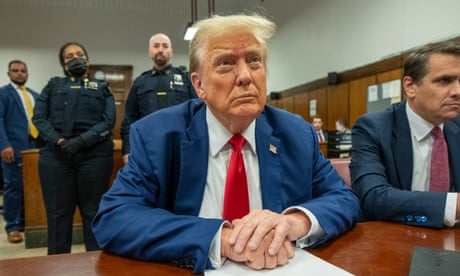
Donald Trump’s criminal hush-money trials enters its 13th day Tuesday, following the judge’s warning that the ex-president could face jail if he kept violating a gag order.
The proceedings on Monday – which featured testimony from Deborah Tarasoff, a Trump Organization accounts payable supervisor, and Jeffrey McConney, the company’s former comptroller – were overshadowed by judge Juan Merchan finding Trump in criminal contempt for the 10th time before they even took the stand.
Merchan’s decision comes just days after he found Trump in criminal contempt, and hit with a $9,000 fine, over other comments that flouted the order that bars him from discussing trial witnesses or jurors.
“Mr Trump, as you know the prosecution has filed three separate motions to find you in criminal contempt,” Merchan told Trump before testimony resumed. “It appears that the $1,000 fines are not a deterrent.”
“The last thing I want to do is put you in jail. You are the former president of the United States and possibly the next president as well,” Merchan said. “But, at the end of the day, I have a job to do, and part of that job is to protect the dignity of the judicial system.”
Trump’s actions, Merchan said, “constitute a direct attack on the rule of law”.
He said: “I cannot allow that to continue.
“So as much as I do not want to impose a jail sanction, I want you to understand that I will, if necessary and appropriate.”
The testimony from McConney and Tarasoff sought to place Trump at the center of his company and personal finances – to undermine any defense argument that he was not at the helm of bill-paying.
“Who has the authority to approve invoices?” prosecutor Matthew Colangelo asked McConney.
“President Trump, before he became president,” McConney said. After Trump became president, those who could sign off on invoices included the former chief financial officer Allen Weisselberg, as well as some of Trump’s adult children.
McConney was also asked about a discussion he had with Weisselberg on repaying Cohen. Weisselberg, an unwavering Trump loyalist, was imprisoned after being convicted of perjury for lying in Trump’s civil fraud case.
“We have to reimburse Michael,” McConney remembered Weisselberg saying during an early 2017 meeting. During that meeting, they determined that Cohen was owed $420,000 for legal expenses and taxes; the sum included a bonus. “He tossed the pad toward me, I started taking notes on what Allen said.”
Colangelo teased out that Trump – whom prosecutors have cast as incredibly cheap – heaped more money on Cohen than was normal for him to do. “Do these notes show that Mr Cohen was receiving $360,000 back on a $180,000 expense?” Colangelo said.
“Yes,” McConney replied.
“Are you aware of another incident where an expense was doubled because of taxes?” Colangelo continued. McConney said no.
During Tarasoff’s time on the stand, the prosecution asked her about business documents detailing payments to Cohen, including copies of voided checks. The checks were from the Donald J Trump Revocable Trust and, starting in spring 2017, Trump’s personal account.
Tarasoff confirmed that Cohen was paid numerous monthly installments of $35,000 from Trump’s personal account.
“Whose signature is that?” Tarasoff was asked.
“Mr Trump’s,” she said.